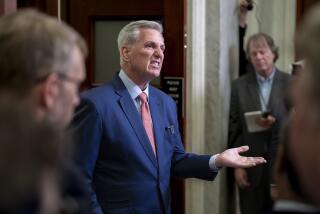Welfare Reform Debaters Scout Out Middle Ground : Congress: House majority leader shows willingness to compromise on benefits to teen-age mothers. Flexibility on budget also emerges.
- Share via
WASHINGTON — Though still exchanging threats and harsh criticism, top GOP and Clinton Administration officials began signaling Sunday some grounds for possible compromise on two major issues before Congress--welfare reform and funding government operations--to avert a collision.
In a broadcast interview, House Majority Leader Dick Armey (R-Tex.) indicated willingness to consider a compromise on a new federal welfare reform plan that would allow states to pay benefits to teen-agers who have babies.
The House has approved a reform plan that excludes direct payments to teen-age mothers. However, the Senate has approved a milder measure without the ban, and the White House has threatened a veto if the final version, now before a conference committee, does not hew closely to the Senate’s.
Armey said he and other House conservatives object strongly to anything resembling a federal subsidy for out-of-wedlock births. But, he added: “If some state wants to be foolish and give cash grants to young girls for illegitimate births, I think we could probably see some latitude.”
There are other major differences between the two versions of a new welfare system. But both sides have identified this area as among the likeliest for cooperative action between the Administration and Congress.
The deliberations on a final reform blueprint and over the federal budget this fall will be a major test of whether the GOP leadership and the Administration are still capable of compromise on major domestic matters, or will head to the 1996 campaign with a blitz of vetoes and blunted initiatives.
On the looming budget battle, Armey, speaking on CBS-TV’s “Face the Nation,” suggested that Republican leaders might move to pass special legislation to allow the government to pay its bills on a week-to-week basis to avoid a partial shutdown of operations while the issue is pending.
In November, Congress must lift the federal debt ceiling to pave the way for the U.S. government to continue paying interest on its $4.9-trillion debt.
Armey said the GOP proposal would give President Clinton authority to “pay out those bills that are urgent and necessary, like we do in our household, and defer payment on those bills where deferred payment is possible.”
In a separate interview, White House Chief of Staff Leon E. Panetta said he welcomed new ideas to avoid a shutdown but indicated he was not sure how this method would work.
He also unleashed stinging denunciation of any move to link lifting the federal debt ceiling to resolving the federal budget. “We have a responsibility to protect the credit of the United States of America,” Panetta said on CNN’s “Late Edition.” “We ought not to use that as a gun somehow to get our way on these other issues. That, I think, is irresponsible.”
Last week, Treasury Secretary Robert E. Rubin warned that refusing to raise the debt limit would throw the financial markets into chaos and result in higher interest rates.
But on Sunday, Armey discounted those statements as excessive and unduly alarmist. He also stressed that Republican conservatives will not be making all of the concessions if a welfare compromise is to be achieved.
The government must use financial means to discourage behavior it considers destructive, he said.
“If you’re a youngster and you have a baby, and we get health care, housing, food and shelter to the child, then it’s important not to give the cash grant to the mother,” Armey said. “And I’m going to stand on that ground. We have got to stop this epidemic of out-of-wedlock births.”
But Armey agreed that one compromise would be language in the original House Republican welfare bill that permitted individual states to exempt themselves from restrictions on giving benefits to teen-age mothers.
“That may be a ground where we can sit down and work out the differences between us,” he said.
More to Read
Get the L.A. Times Politics newsletter
Deeply reported insights into legislation, politics and policy from Sacramento, Washington and beyond. In your inbox twice per week.
You may occasionally receive promotional content from the Los Angeles Times.










